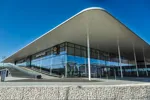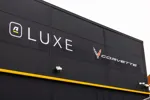The concept, which involves hosts on the showroom floor rather than sales staff, required a huge level of investment and has been criticized by some dealers as being out of step for a brand which, until this year, took less than 1% market share in the UK.
The original proposal, which involved five ‘zones’ capturing the essence of the Saab brand, including history, philosophy, technical expertise and model offerings, did get watered down, but the sums involved, such as a £12,000 interactive model screen display, were still high.
Has it been worth the investment? Yes, according to Tony Mitchell, managing director at Watford-based Viking Saab and a member of Saab’s European dealer board.
“The screen display, for instance, is a good way for customers to see the different options available on each model and it does help us to upsell them to a higher specification,” he says. “The Unlimited concept also makes a big difference when it comes to closing the deal because the environment is right – our facilities are as good as Mercedes-Benz or BMW.”
Mitchell acquired Viking, a Saab dealership since 1984, nine years ago. He’s proud of the fact the business has always increased sales each year, with just one exception, and always turned a profit. “It’s about focusing on the basics and treating customers properly. We recognize that they will shop around and that we have to offer something special,” Mitchell says.
“And we ensure we get the last shot at them by keeping in touch during the sales process. We will find a way of making the deal acceptable, such as using finance packages or even converting them to a pre-registered car if price is an issue. It’s all the old techniques that many dealers have forgotten about or just don’t do now.”
Those techniques include contract hire, generally frowned on by Saab, but a funding option that helps Viking compete against volume brands and hit its sales targets. “There’s also the option of doing more owner-driver business, although it doesn’t count towards the monthly sales target,” adds Mitchell.
The business has gained celebrity status within the Saab organization, thanks largely to its Watford location (Saab’s Marlow headquarters is less than 30 miles away). It has seen virtually every member of the Saab management team, UK and global, at one time or another. No wonder both showroom and workshop are spotless.
This year, Viking Saab is targeted to sell 280 new cars (2004: 240), although Mitchell is confident of exceeding 300. That puts the company slightly behind Saab GB’s national performance, year to date up 41%, but while much of that increase is in the fleet market, the bulk of Viking’s sales is retail. SMMT figures, which show UK retail sales down almost 11%, are jokily dismissed by Mitchell: “I didn’t read about that – no-one told me.”
He believes that Saab dealers are well placed to capitalize in a tough market because they have always had to fight for the deal. “Those dealers with a history of order-taking are finding it hard,” he adds.
Relationships with Saab have transformed since the Swedish carmaker’s acquisition by General Motors in 2000, although most of that change has been over the past couple of years as GM executives recognized they needed to invest in the marque.
“Saab has changed from a cosy company to a business partner under GM. Some dealers prefer the old way, but change is change,” Mitchell says, philosophically.
“General Motors took an age to do something with Saab, but they have immense resources to sort out the brand. It’s been almost an unwanted child at times and we’ve had a few teething problems with parts supply, but in the last three years they have realized that to move forward they need to invest in product, especially as Saab has a small range.”
He expects the new 9-3 Sportswagen to be a success and points to the company’s five-year model plan, which includes an SUV, crossover vehicle and estate – all incremental products. “The business is ready to take off.”
The Sportswagen will help to boost margins and profits, which have been an issue within the Saab network. Many retailers have been forced to give away much of the margin to make the sale, recouping on servicing, volume bonuses and standards-related payments.
Return on sales is improving, although with Saab models available with a high level of standard equipment, it’s more difficult for dealers to sell options in the showroom. The knock on is stronger used car values, but it’s an area where dealers currently under perform. Viking will sell around 200 this year, and recognizes used cars offer a big opportunity.
Surprisingly, though, it focuses solely on Saab used cars, despite an increase in other models as the franchise wins conquest business. “ I have traded more than 100 cars this year that were non-Saab,” says Mitchell. “We’ve never sold these cars so we do not have a reputation for it.”
Mitchell predicts Saab will be selling 25,000-30,000 cars within three years, a position that he believes will justify a full network of stand alone showrooms instead of the mix of dual-franchised facilities.
“We’ve had the nasty times, this is where it starts to improve,” he says. “There are much worse places to be than with a Saab franchise.”
The business
Name: Viking Saab
Turnover (2004): £9.1m
Number of employees: 26
New car sales (2004): 240
Used car sales (2004): 180
Number of sites: One (Watford)














Login to comment
Comments
No comments have been made yet.